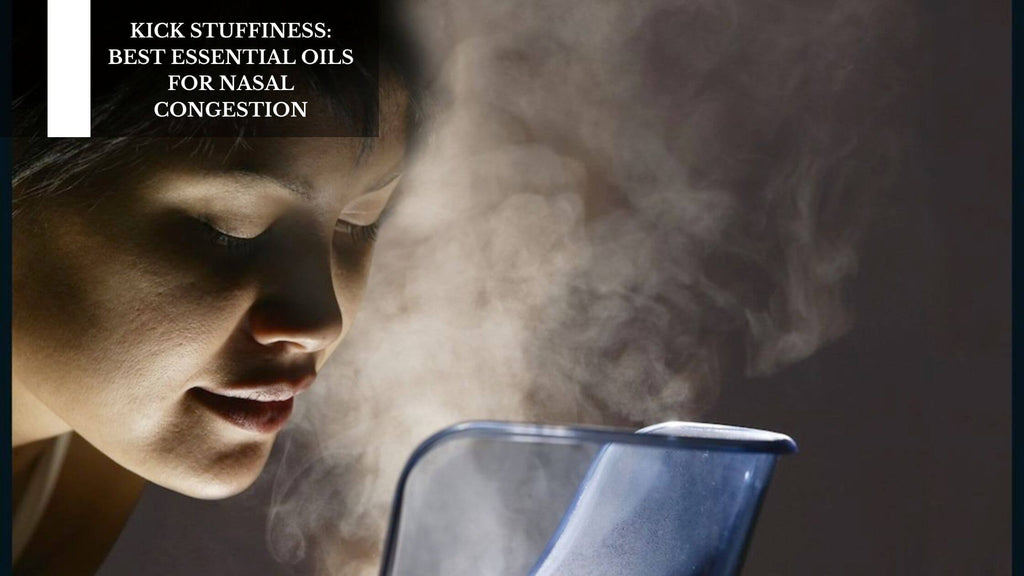Kick Stuffiness: Best Essential Oils For Nasal Congestion

Nasal congestion can be a severe or chronic condition that causes the nose to be stuffy, runny, itchy, or dry. It is often accompanied by a feeling of pressure in the head and neck areas as well as headaches. Its symptoms can include sneezing, post-nasal drip, headache in either the ear or head region without pain associated with sinusitis, and tiredness when lying down at night due to the inability to breathe deeply without causing pain during sleep. Nasal congestion can be caused by several different conditions such as sinusitis, allergic rhinitis, hypersensitivities to airborne substances, inhalation of cold or dry air, or a chemical irritation caused by certain types of cleaning agents.
You may also like:
Nasal congestion may also be caused by viral infections such as the common cold. In particular, children may experience problems with nasal congestion due to croup. Many things can cause an increase in mucus production. The most common ones are sinusitis, allergies, chronic or acute bronchitis, and severe colds and flu. It is recommended to treat nasal congestion at the earliest possible stage of infection with herbal remedies and humidifiers. Nasal congestion is a very common disorder and many people experience it every year, but often they give up on home remedies because the ones that they try don't work for them.
Best essential oils for nasal congestion
1) Basil Essential Oil
It contains about 1% thujone which is a natural sedative and anti-inflammatory. Some essential oils are used to treat asthma and allergies, both of which can cause nasal congestion. Basil Essential Oil can also help improve a variety of other respiratory disorders such as bronchitis, whooping cough, and cystic fibrosis as well as influenza, pneumonia, tuberculosis, bronchitis, and sinusitis. Basil has been used for centuries to treat colds and flu because of its strong antiviral effect.
2) Cypress Essential Oil
It is a great remedy for nasal congestion because it helps to unblock the sinuses. Cypress Essential Oil also helps to soothe the mucous membranes and can be used to reduce inflammation as well as being an effective antihistamine.
3) Eucalyptus Essential Oil
Eucalyptus essential oil is known for its antibacterial, anti-inflammatory, antiseptic, diuretic, sedative, and analgesic effects. It is great at breaking up mucus, has a mild decongestant action, and helps relieve sinus buildup as well as helping with pain relief. Eucalyptus Essential Oil is also known as a good cold and flu remedy because of its antibacterial properties.
4) Fir Needle Essential Oil
It contains pinene which helps to thin the mucous secretions and relieve nasal congestion. Fir Needle Essential Oil can also help to improve breathing from the chest cavity which is great for those with bronchitis or other long-term lung conditions.
5) Helichrysum Essential Oil
It is a great anti-inflammatory agent which helps to reduce swelling and inflammation thus easing nasal congestion caused by it. It is also beneficial in the treatment of wounds, burns, bruises, scars, and skin inflammations. Helichrysum Essential Oil is also great for treating headaches and migraines in conjunction with peppermint oil and can help relieve sinus pain when used with eucalyptus.
6) Peppermint Essential Oil
It is often considered by many as the best essential oil for nasal congestion because of its very strong decongestant quality. Peppermint Essential Oil also contains menthol which has the effect of thinning mucous secretions thus improving breathing at night.
7) Thyme Essential Oil
Thyme essential oil contains thymol which helps to act as an expectorant to expel mucus from the lungs and airways which is good for those suffering from bronchitis. Thyme Essential Oil also has a calming action and can help with stress and nervous tension. Many people find thyme very soothing to the throat and nose area when feeling unwell.
8) Tea Tree Essential Oil
It has many great benefits: antifungal, antibacterial, antiviral, antiseptic, anti-inflammatory, and antihistamine. It is also effective in relieving allergic reactions of all types including seasonal allergies which may be part of the causes of nasal congestion. Tea Tree Essential Oil is a great immune stimulant as well as an antiseptic so it can help to keep you healthy thus avoiding colds and flu that can cause nasal congestion.
9) Lavender Essential Oil
It contains a camphor-like substance that helps to relieve nasal congestion. Lavender Essential Oil can also help with pain relief and is considered to be a good sedative which makes it a great choice for those who have trouble falling asleep because of nasal congestion.
10) Clove Essential Oil
Clove essential oil is a strong antiseptic that helps to kill bacteria in the nose. It is also an antifungal, anti-depressant, and antimicrobial. The smell of clove is very strong and can be useful to relieve symptoms of a cold or flu that you have as well as help with general congestion of both the head and sinus area. Clove Essential Oil can be used to relieve pain in the sinus area as well as reduce swelling, inflammation, and redness in the nasal area.
How to use essential oils for nasal congestion?

Step 1: Open up the sinuses and nose and breathe using a vaporizer or humidifier.
Step 2: Inhale or apply a drop to the inhaled problem area.
Step 3: Breathe in the vapours from the vaporizer to loosen up mucus.
Step 4: Apply a drop of essential oil to the inhaled problem area.
Step 5: Breathe in vapors from the vaporizer by exhaling into your mouth and running this breath over any essential oil applied on your face, chest, legs, or back of the upper arms region all around them for better results.
You may also like:
Step 6: Use as often as needed.
FAQs
1) Can I use essential oils for nighttime nasal congestion?
Yes, you can use some of the essential oils for nighttime nasal congestion by using a vaporizer or a humidifier to inhale vapors. It will loosen up the mucus and help to make breathing easier at night time. You could also add a drop of eucalyptus or peppermint oil to your pillowcase so that the oil floats into your nose while sleeping.
2) How do I use eucalyptus oil?
To relieve nasal congestion caused by allergies as well as cystic fibrosis, bronchitis, or sinuses. Add bath water or put drops directly into the eyes to relieve eye congestion. Use a vaporizer or humidifier to inhale vapors on a hot day when you feel stuffy or have a runny nose. To use in a bath, add eucalyptus leaf to the water or place a few drops of eucalyptus oil into the warm bath. You could also add a drop to your pillowcase or cloth at night to inhale the vapors into your nose and sinuses.


Leave a comment